Phillips Academy is a co-educational university-preparatory school for boarding and day students in grades 9–12, along with a post-graduate year. The school is in Andover, Massachusetts, United States, 25 miles north of Boston. Phillips Academy has 1,131 students, and is highly selective, accepting just 9% for the 2022–2023 school year. It is part of the Eight Schools Association and the Ten Schools Admissions Organization, as well as the G30 Schools Group.

Andover is a town in Essex County, Massachusetts, United States. It was settled in 1642 and incorporated in 1646. At the 2020 census, the population was 36,569. It is located 20 miles (32 km) north of Boston and 4 miles (6.4 km) south of Lawrence. Part of the town comprises the census-designated place of Andover. It is twinned with its namesake: Andover, Hampshire, England.

Charles Bulfinch was an early American architect, and has been regarded by many as the first American-born professional architect to practice.
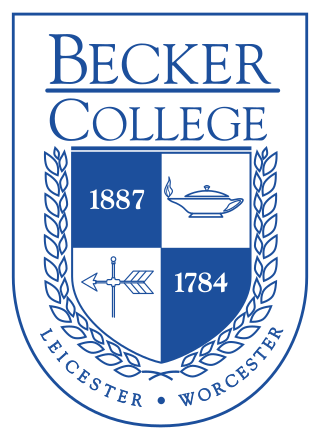
Becker College was a private college in Worcester and Leicester, Massachusetts. Becker College traced its history from the union of two Massachusetts educational institutions—one founded in 1784 and the other in 1887. The college closed at the end of the 2020–21 academic year.

Ellis Fuller Lawrence was an American architect who worked primarily in the U.S. state of Oregon. In 1914, he became the co-founder and first dean of the University of Oregon's School of Architecture and Allied Arts, a position he held until his death.
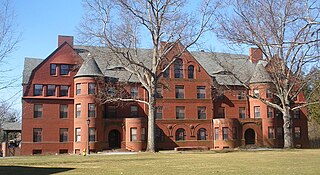
Abbot Academy was an independent boarding preparatory school for women boarding and day care for students in grades 9–12 from 1828 to 1973. Located in Andover, Massachusetts, Abbot Academy was notable as one of the first incorporated secondary schools for educating young women in New England. It merged with Phillips Academy in 1973 and campus buildings along School Street continue to be used for the combined school. Some Abbot traditions continue at the combined private boarding school such as Parent's Weekend. Since the 40th anniversary in 2013 of the merger of the two schools, there has been renewed interest in Abbot's history and traditions.
Andover Newton Theological School (ANTS) was a graduate school and seminary in Newton, Massachusetts, affiliated with the American Baptist Churches USA and the United Church of Christ. It was the product of a merger between Andover Theological Seminary and Newton Theological Institution. In recent years, it was an official open and affirming seminary, meaning that it was open to students of same-sex attraction or transgender orientation and generally advocated for tolerance of it in church and society.

Adams Academy was a school that opened in 1872 in Quincy, Massachusetts, United States. John Adams, the second President of the United States, had many years before established the Adams Temple and School Fund. This fund gave 160 acres (0.65 km2) of land to the people of Quincy in trust. His objective for the money was to build a school in honor of his friends John Hancock and Josiah Quincy, who, like Adams, lived in the town of Quincy, Massachusetts. John Hancock's birth place had been on the land.

The Newton Theological Institution Historic District is an historic district in the village of Newton Centre in Newton, Massachusetts. It encompasses not only the campus of the Newton Theological Institution, now known as the Andover Newton Theological School, but also a cluster of fashionable 19th century houses north of the campus, on Herrick Road and Chase and Cypress Streets. The school was the first outside educational institution in Newton. The district was listed on the National Register of Historic Places in 1986.

The Asa and Sylvester Abbot House is a historic two-family house at 15–17 Porter Road in Andover, Massachusetts. Built in the 1830s, it is a rare local example of the duplex in a rural setting. It was listed on the National Register of Historic Places in 1982, where it is incorrectly listed at 15–17 Andover Street.

The Academy Historic District is a historic district in the center of Wilbraham, Massachusetts. Its 65 acres (26 ha) encompass the historic center of Wilbraham, as well as the historic central portion of the campus of the Wilbraham & Monson Academy. It includes properties on Mountain Road, Main Street, and Faculty Street. Wesleyan Academy was founded in 1817 and moved to Wilbraham in 1824; its oldest buildings date to 1825. It merged with Monson Academy in the 20th century to form the present school that occupies the academic premises. The academy was a major center of Methodist teaching in New England, and was a prominent factor in the town's growth.

The Andover Village Industrial District encompasses one of the 19th century industrial mill villages of Andover, Massachusetts known locally as "The Village". The growth of this village contributed to the decision in the 19th century to separate the more rural area of North Andover from the town. It is centered on a stretch of the Shawsheen River between North Main Street on the east and Moraine Street on the west. Most of the district's properties lie on Stevens Street, Red Spring Road, Shawsheen Road, and Essex Street, with a few properties also located on adjacent roads.

Hartwell and Richardson was a Boston, Massachusetts architectural firm established in 1881, by Henry Walker Hartwell (1833–1919) and William Cummings Richardson (1854–1935). The firm contributed significantly to the current building stock and architecture of the greater Boston area. Many of its buildings are listed on the National Register of Historic Places.

Cummings and Sears was an architecture firm in 19th-century Boston, Massachusetts, established by Charles Amos Cummings and Willard T. Sears.
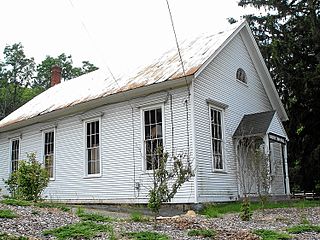
The Andover Center Historic District encompasses the historic town center of Andover, Connecticut. Centered on the junction of Hebron Road with Center Street and Cider Mill Road, the district includes houses dating to the town's early history, civic buildings including a library and former town hall, and the town's first cemetery. The district was listed on the National Register of Historic Places in 2003.
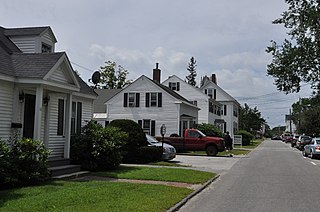
The Federal Street Historic District of Brunswick, Maine encompasses a part of the town whose development was influenced by its 18th-century success as a shipping center, and by the presence of Bowdoin College, whose historic central campus is part of the district. In addition to the campus, the district includes a series of relatively high-style Federal and later-period houses along Federal Street and Maine Street, which join the campus to downtown Brunswick. The district was listed on the National Register of Historic Places in 1976.
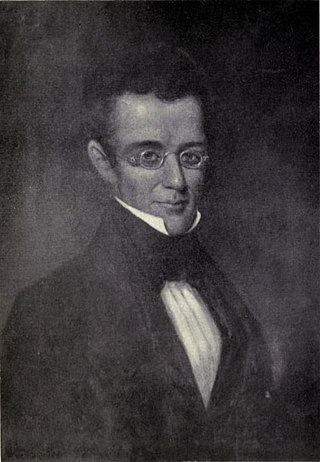
Osgood Johnson was an American educator and 5th Principal of Phillips Academy Andover from 1833 to 1837.

The Andover Public Schools district is the public school district for the town of Andover, Massachusetts. Overseeing 10 educational facilities, ranging from pre-kindergarten to the 12th grade, the district is administrated by superintendent Magda Parvey, who reports directly to an elected school committee, consisting of five residents of the town elected for three-year terms.

Philena McKeen was an American educator and 11th principal of Abbot Academy in Andover, Massachusetts. During her thirty-year tenure, she managed the school in its "Golden Age" and established a curriculum that "educated for life."

Otis A. Merrill was an American architect. In association with various partners he practiced architecture in Lowell, Massachusetts, from 1873 until 1900.





















